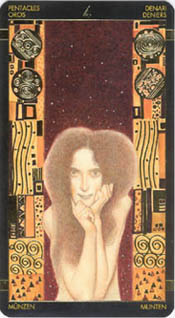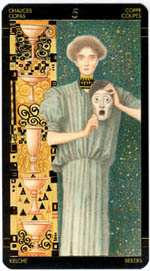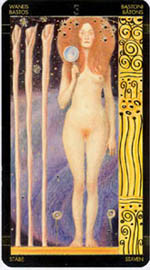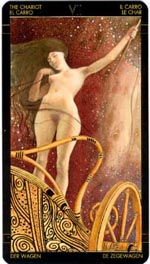|

 A specialty of Lo Scarabeo's are their golden packs, characterized with part of the images being covered
with a layer of shinning gold. It is a technique, which so far has not been copied by other tarot publishers,
maybe because Lo Scarabeo has patented it, or because it has not been possible for others to find out how it
is done. It looks like the gold is added by stamping, since the layer lies deeper than the normally inked
imprint, a sort of negative embossment, so to speak. Undoubtedly, the decks made this way over the years
have been a success with the collectors.
A specialty of Lo Scarabeo's are their golden packs, characterized with part of the images being covered
with a layer of shinning gold. It is a technique, which so far has not been copied by other tarot publishers,
maybe because Lo Scarabeo has patented it, or because it has not been possible for others to find out how it
is done. It looks like the gold is added by stamping, since the layer lies deeper than the normally inked
imprint, a sort of negative embossment, so to speak. Undoubtedly, the decks made this way over the years
have been a success with the collectors.
In my opinion, not all decks produced using this technique gained from it, but in the case of "The Golden
Tarot of Klimt" the gold is well placed.
The deck is inspired by the art of the Austrian artist Gustav Klimt (1862-1918), a controversial figure in
the Vienna art scene around the turn of last century. Klimt's sensual and erotic paintings and drawings
were considered decadent with their use of gold paint, many details, abstract forms and symbols and their
presentation of naked female figures. Despite his controversial reputation, Klimt obtained at a young age
several public commissions like wall decorations for a theatre and for an art museum. In 1897 he became a
founding member of "The Wiener Secession Movement" which organized well attended exhibitions with
unconventional artists.

 The Golden Tarot of Klimt does not render Klimt's own art but the art of A.A. Atanassov, a fact that the
publisher does not hide, but does not emphasize either. I am convinced that many will believe that the
excellent illustrations are the works of Klimt himself. They imitate the style and here and there they
even are direct re-drawings of Klimt's images. I would say, that Atanassov's characters perhaps are more
decadent in style than Klimt's own art.
The Golden Tarot of Klimt does not render Klimt's own art but the art of A.A. Atanassov, a fact that the
publisher does not hide, but does not emphasize either. I am convinced that many will believe that the
excellent illustrations are the works of Klimt himself. They imitate the style and here and there they
even are direct re-drawings of Klimt's images. I would say, that Atanassov's characters perhaps are more
decadent in style than Klimt's own art.
All in all, the pack is worth getting hold of. Very nice to look at and also an example of a perfect
printing job
|